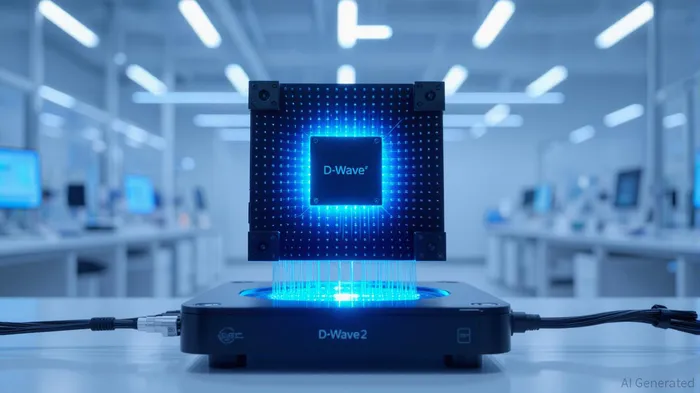Quantum Computing Breakthroughs: Why D-Wave Quantum Stock Is Outpacing IonQ in 2025
The quantum computing sector has long been a speculative battleground, but 2025 has proven to be a year of stark divergence between two of its most prominent players: D-Wave QuantumQBTS-- (QBTS) and IonQIONQ-- (IONQ). While both companies are pioneering next-generation technologies, their contrasting approaches to innovation, execution, and financial discipline have created a dramatic gapGAP-- in stock performance. D-Wave's shares have surged 141.6% year-to-date, far outpacing the S&P 500's 8.5% gain and IonQ's anemic 3.6% rise. This divergence is not a fluke—it's the result of a critical inflection point in the sector, where timing, technological differentiation, and operational execution now matter more than ever.

The Quantum Divide: Quantum Annealing vs. Gate-Based Computing
D-Wave and IonQ are pursuing fundamentally different paths to quantum supremacy. D-Wave's focus on quantum annealing and hybrid systems has delivered tangible, near-term value for enterprise clients. Its Advantage2 system, now featuring over 4,400 qubits, 40% greater energy scale, and 75% reduced noise, is already solving real-world optimization problems in logistics, materials science, and AI. By combining quantum processors with classical computing in hybrid architectures, D-WaveQBTS-- has bridged the gap between theoretical potential and practical deployment.
IonQ, meanwhile, is betting on gate-based computing, a more versatile but longer-term approach. Its trapped-ion qubits offer high coherence and fidelity, but scaling these systems to commercial viability remains a challenge. While IonQ's recent acquisitions—such as Lightsynq for photonic interconnects and Oxford Ionics for quantum memory—position it for a future quantum internet, these innovations are still years from profitability.
Execution: D-Wave's Near-Term Traction vs. IonQ's Long-Term Ambition
The key to understanding the stock performance gap lies in execution. D-Wave has demonstrated operational excellence in 2025, with first-quarter revenue surging 509% year-over-year to $15 million. Its GAAP gross profit expanded to $13.9 million in Q1 2025, up from $1.7 million in Q1 2024, while adjusted EBITDA losses narrowed. A $400 million equity raise in July 2025 has further strengthened its balance sheet, funding R&D and strategic acquisitions to accelerate commercialization.
IonQ, by contrast, reported flat Q1 2025 revenue of $7.6 million compared to the prior year, despite a $1 billion equity offering. While it has $1.68 billion in pro-forma cash, its net loss of $32.3 million in Q1 2025 (down from $39.6 million in Q1 2024) underscores the challenges of scaling a gate-based model. IonQ's roadmap is ambitious—its Forte and Tempo systems aim to deliver 1 million logical qubits—but the path to profitability remains unclear.
Investment Timing: The Quantum Tipping Point
2025 marks a pivotal moment in quantum computing. Investors are increasingly prioritizing companies that can deliver immediate value over those chasing theoretical breakthroughs. D-Wave's hybrid systems have already proven their mettle:
- A collaboration with Ford Otosan reduced vehicle scheduling time from 30 minutes to under five.
- A partnership with Japan Tobacco enhanced generative AI for drug discovery, demonstrating quantum's role in accelerating R&D.
- A quantum computational supremacy milestone in Science validated its ability to solve problems intractable for classical systems.
IonQ's long-term vision for fault-tolerant systems and quantum networking is compelling, but its slower revenue growth and larger losses have left investors waiting for tangible results. While its recent acquisitions add strategic depth, they also increase complexity and burn rate.
The Road Ahead: Strategic Implications for Investors
For investors, the lesson is clear: timing is everything in quantum computing. D-Wave's ability to monetize its technological edge—through scalable, practical applications—has positioned it as a near-term winner. Its strong financials, expanding margins, and aggressive R&D funding suggest it can maintain momentum into 2026.
IonQ, however, remains a high-risk, high-reward proposition. Its gate-based approach could dominate the post-error-correction era, but the path is littered with technical and financial hurdles. While its $1.68 billion war chest provides flexibility, patience is a virtue here.
Conclusion: D-Wave's Quantum Leap
The quantum computing race is no longer just about technical prowess—it's about execution, commercialization, and investor sentiment. D-Wave has mastered the art of translating quantum breakthroughs into measurable business outcomes, while IonQ remains a visionary but unproven long-term play. For investors seeking to capitalize on the sector's growth in 2025, D-Wave's stock offers a compelling combination of innovation, traction, and financial discipline. IonQ, meanwhile, warrants a watchful eye but may require a longer holding period to justify its risk profile.
In the quantum age, the companies that thrive are those that can deliver today, not just promise tomorrow. D-Wave Quantum is rewriting the rules—by turning theory into value.
Delivering real-time insights and analysis on emerging financial trends and market movements.
Latest Articles
Stay ahead of the market.
Get curated U.S. market news, insights and key dates delivered to your inbox.

Comments
No comments yet